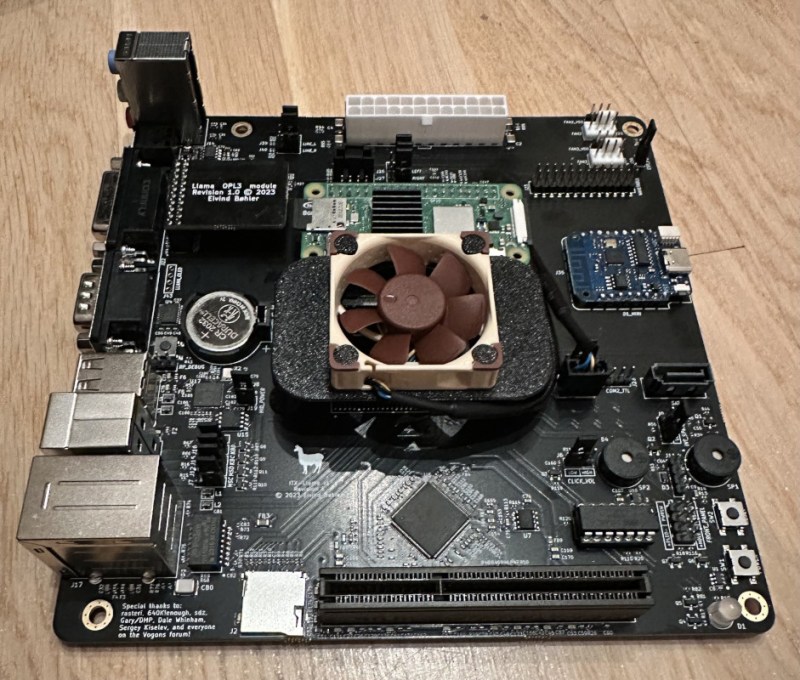As the march of time continues on, it becomes harder and harder to play older video games on hardware. Part of this is because the original hardware itself wears out, but another major factor is that modern operating systems, software, and even modern hardware don’t maintain support for older technology indefinitely. This is why emulation is so popular, but purists that need original hardware often have to go to extremes to scratch their retro gaming itch. This project from [Eivind], for example, is a completely new x86 PC designed for the DOS and early Windows 98 era.
The main problem with running older games on modern hardware is the lack of an ISA bus, which is where the sound cards on PCs from this era were placed. This build uses a Vortex86EX system-on-module, which has a processor running a 32-bit x86 instruction set. Not only does this mean that software built for DOS can run natively on this chip, but it also has this elusive ISA capability. The motherboard uses a Crystal CS4237B chip connected to this bus which perfectly replicates a SoundBlaster card from this era. There are also expansion ports to add other sound cards, including ones with Yamaha OPL chips.
Not only does this build provide a native hardware environment for DOS-era gaming, but it also adds a lot of ports missing from modern machines as well including a serial port. Not everything needs to be original hardware, though; a virtual floppy drive and microSD card reader make it easy to interface minimally with modern computers and transfer files easily. This isn’t the only way to game on new, native hardware, though. Others have done similar things with new computers built for legacy industrial applications as well.
Thanks to [Stephen] for the tip!
















forget sound blaster this will be great for legacy industrial machines that use pc104 and are getting harder and harder to find good mb’s for. you can get the isa to pc104 adapters cheap enough but the hardware is falling away and many of these machines are not cheap to replace.
PC104 Vortex86 boards have been around for a long time. The point of this project was to make a regular ITX motherboard that could take these modules.
If PC/104 is hard to find, it’s probably because this was never a “consumer thing”. They are still quite common for industrial applications, and still in production.
agreed to both of your points however with not even that old of machinery that i have had to deal with they still used older cpu’s which caused the isa/pc104 bus to freak out. something of this nature that appears to be in the “lower” cpu class looks interesting. The number of times i’ve ran across a pc104 pc that will not communicate correctly because of timing because of the newer architecture is big. So yeah i still think this will be nice for that reason.
“just plug in the module” aaand it’s offset by one pin row.
The screw-up is magically corrected without comment later in the video. I wonder whether that may have fried one of his modules already.
If it were not for the heat sink bracket, SOM-128-EX could fit two TFM-132-02-S-D shrouded pin headers.
Big problem is the cost, can still scare up Pentium II, III and 4 boards for much less. And even if you want a Vortex86 a thin client might be $40. I have yet to try SBEMU on mine. But funny enough I didn’t play with sound back in the day, so I don’t miss it 🤣.
I wonder if it would be possible to make a USB sound card work in DOS with SB emulation 🤔, and if a Pico chip could do it.
I’m still watching this space with interest, thanks for the article.
It’s certainly possible in principle.
The problem is that there’s no universal driver for USB host controllers,
such as UHCI/OHCI, EHCI and XHCI.
If there was, USB HID devices could be supported.
The only universal driver there is, I think, is an USB mass storage driver.
It’s available at win31.de page: http://win31.de/edrivers.htm
Then there’s a bunch of USB mice drivers,
which are limited but compatible with Norton Commander in text-mode.
https://tinyurl.com/3uwfb569
There’s also an USB serial driver, but it needs applications support.: DOSUSB – USB driver package for DOS
It doesn’t emulate an traditional 16450 COM port, though.
Last but not least, there’s that CH375 chip that’s being used by DOS community.
It founds its way into ISA USB cards and is very versatile.
It’s not a traditional USB host controller, though.